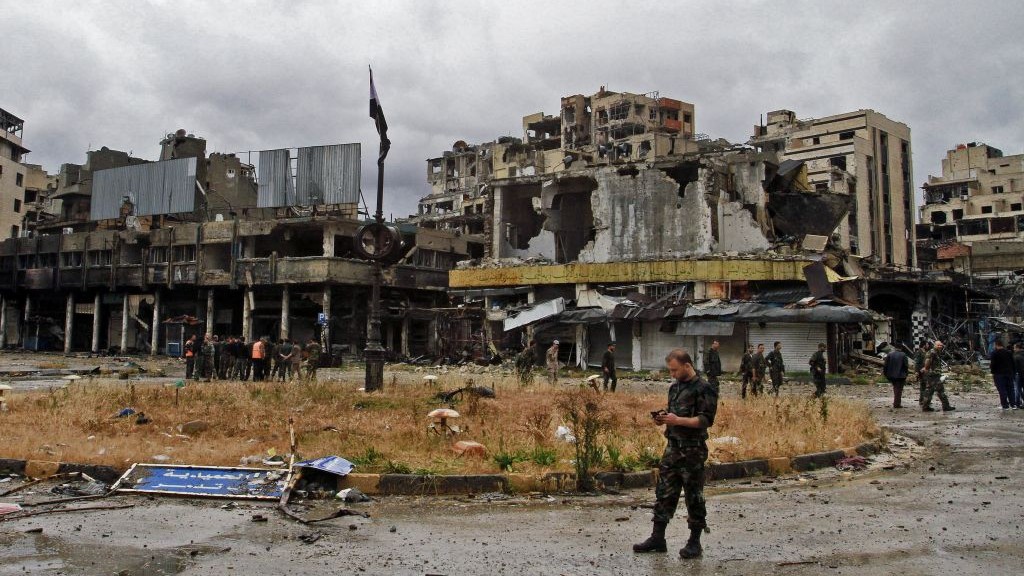By Ammar Azzouz
Once it was the capital of the Syrian Revolution and in all the newspaper headlines. In its neighborhoods and alleyways, the rebels held out against government forces for years. Many buildings were flattened or shot full of holes. In the end, as everyone knows, the government took back what was left.
Even before Vladimir Putin invaded Ukraine, the world had moved on from Homs. One of the most destroyed cities in Syria became a footnote. But not to me.
I left Syria in November 2011. Peaceful protests were sweeping across the city but they had been met with brutal violence. Tanks were already on the outskirts of my neighborhood, snipers perched on residential tower blocks. Death was getting very close.
I found refuge in Britain, and since 2017 I have lived in enormous, diverse, wonderful London. I have just become a British citizen. But my heart aches for Homs.
When I look out the window of my room I can see the trees of Hampstead Heath and Highgate Cemetery, the clouds marching gently above them. But my mind is elsewhere. I remember the evening a friend of mine was killed for being part of a protest. I remember two children who were shot in my street, men and women screaming, the blood on the ground. How can clouds march through all this grief?
When I pick up a coffee in a cafe in Kentish Town, I remember coffee time in Homs with my family and friends, my neighbors. The nostalgia for a lost life brings me to a stop in the street.
At dinner in a restaurant in London, I look at the bill. My friend sees something in my face and asks me what’s wrong. This bill is two months’ salary for a young man in Syria working two shifts every day. My friend says I should live my life, that I can’t change the world. We pay. I wonder why it is that I have the right to live.
In my sleep — when I can sleep — I see dead bodies and destroyed buildings. Even when my dreams are soft and tender, the geography of my unconscious is always Syria, is always my city. I transplant parts of London back onto Homs: the cafe in Kentish Town, Euston Station, my London friends.
I see you, Homs. I won’t forget.
My friends who are still there tell me that life after war is worse than the war. They tell me about the awful silence: Despite all the loss in Homs, there is little public grieving for the death of civilians. Pain is suppressed, mourning remains within, the voices of the capital of the revolution are muted.

My British friends also tell me about their lives. They like to travel. They like to visit their families. They like their pets; some of them take their pets for massages. A friend said he only traveled abroad three times last year because he wanted to be sustainable. I didn’t know what to say.
I’m not sure they could ever understand what it means to be broken into pieces. I’m not even sure I could explain it to them. Maybe my language was destroyed when my city was destroyed.
Sometimes, when they ask me how I am, I want to say: Go and see what happened to Homs, then you’ll know how I am.
With Syrian friends who are also living here in exile, the difficulty is different. Exile is our internal war. Between Homs and London, our minds wander across the minutes, the hours and the days. We want both cities to be safe, bright and beautiful.
Syrians are not the only people who understand an internal war. Recently I posted a tweet about Homs, and so many of the people who replied were Ukrainians sending solidarity. They know what it is to worry desperately about home.
As I try to build a home for myself in Britain, I fill my damaged life with love and work. I surround myself with kind and gorgeous people: writers, academics and artists. I have lovers. Sometimes I think love will save me.
But then that sense of rupture comes for me again.
So I live like a lodger who’s always ready to leave. Inside of me there is a sense of constant movement that will not allow me to attach to objects, and I buy very few things. I’m afraid to lose things again. I lost an entire city once.
I put my big life in small bags: some clothes, my artwork and my books.
I read obsessively. And I find remedy in the words of Ocean Vuong, Elizabeth Bishop, Virginia Woolf, Toni Morrison, Édouard Louis, Milan Kundera and others.
My love of books took me to a new obsession. To write. Fiction is a way to survive and to heal. By writing, I resist the destruction of language even though I could not resist the destruction of my city. I want to write a history of suffering, but I also want to write of the Homs that is generous and kind. The people who even in extremis offer each other solidarity and support.
Homs, I miss you. I will try to find the words and I will fight the forgetting. You are not a footnote to me.
Ammar Azzouz (@Dr_Ammar_Azzouz) is a research associate at the School of Geography and the Environment at the University of Oxford and a lecturer in heritage studies at the School of Philosophy and Art History at the University of Essex.
The New York Times
















Comments About This Article
Please fill the fields below.